Big Tech, Precision, Exodus and Empathy: the RSA’s four scenarios for the future of work offer competing visions for 2035. To bring these scenarios to life, we developed The Future Work Archive: an immersive experience and collection of artefacts. Here we take a look at what the archive offers.
Engaging people in the future of work
Earlier this year we published a report detailing four different scenarios for the future of work in the UK. While research reports have their place, they rarely pull on people’s heartstrings and the prospect of four divergent visions of possible futures can be difficult to engage with.
The RSA is currently working alongside employers and policy makers through a series of Future Work Labs to explore the challenges and opportunities facing different sectors and places, and design solutions to ensure a future of good work. To make our research more tangible and help these decision makers think 15 years ahead, we worked with experience design agency Glider to create an immersive experience: the Future Work Archive.
The Future Work Archive brings to life our scenarios in a way that encourages curiosity and exploration, revealing the underlying values and tensions associated with these different possible futures. The artefacts are a mixture of real and speculative objects which symbolise the shift between our current reality and future scenarios. They highlight how work has changed and make people question which future they want.
VR is the new soma in the Big Tech Economy
In the Big Tech Economy technology develops at a rapid pace, leading to widespread automation, alongside tech companies entering into new markets such as healthcare. Unemployment has crept upwards, with a 20-hour working week the new norm. Economic insecurity is tempered somewhat because technology has delivered significant improvements in the quality of public services while the cost of consumer goods has plummeted. But the spoils of technological progress are really concentrated in the hands of a few tech giants from the US and China.
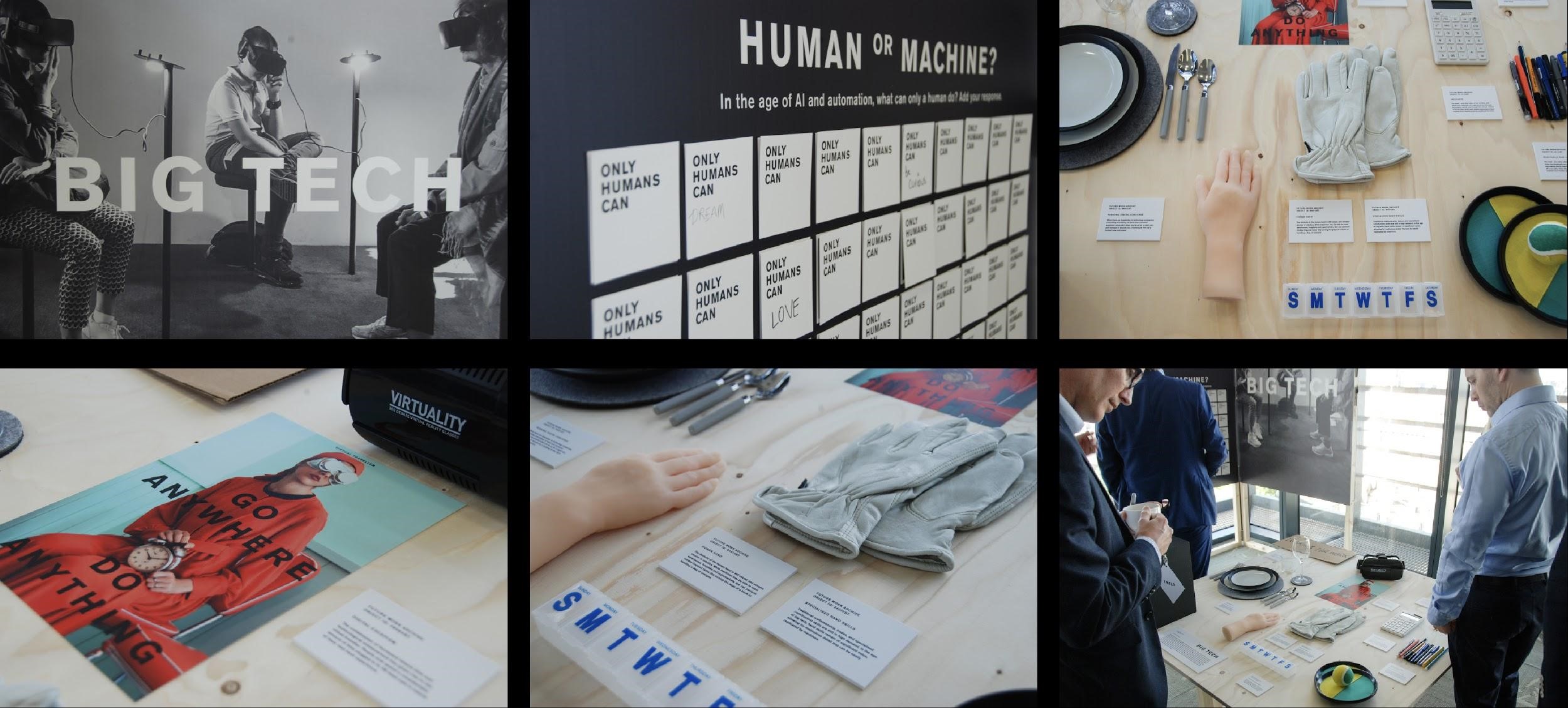
Take a look at this trophy – in an era of privatisation 4.0, a tech company has been awarded a nobel peace prize for its contribution to public services. Meanwhile a cardboard sign reads “looking for work”. The robots have not left us with much to do apart from a few really nimble tasks that only a human hand can perform.
Increased leisure time means more holidays with the kids for some, so there is beach gear in this section of the archive. But advancements in technology have also given rise to a new kind of getaway: virtual reality escapism. People now spend a considerable amount of time wearing VR headsets in search of their next best experience. We’ve produced an advertisement to try and tempt you to plug in.
It can get pretty lonely in the Big Tech Economy. The label next to a bottle of anti-depressants reads: “Epidemiologists posit an increase in screen time, isolation and idleness as potential explanations”. Darren McGarvey’s gritty adaptation of this scenario explores these ideas in more depth: Payment Not Accepted is one of four short science fiction stories which the RSA and the Orwell Foundation commissioned to further bring these visions of the future to life.
5-star ratings for the finest in the Precision Economy
The Precision Economy portrays a world of hyper-surveillance. Technologies such as robotics and driverless cars fail to live up to their hype. But the Internet of Things proves to be prolific, with businesses installing sensors across their supply chains. Automation is modest, but workers are subject to new levels of algorithmic oversight and a pervasive ratings system. Equipped with predictive algorithms and real-time organisational data, employers embrace gig platforms and waves of ‘Uberisation’ ripple across different sectors of the economy.
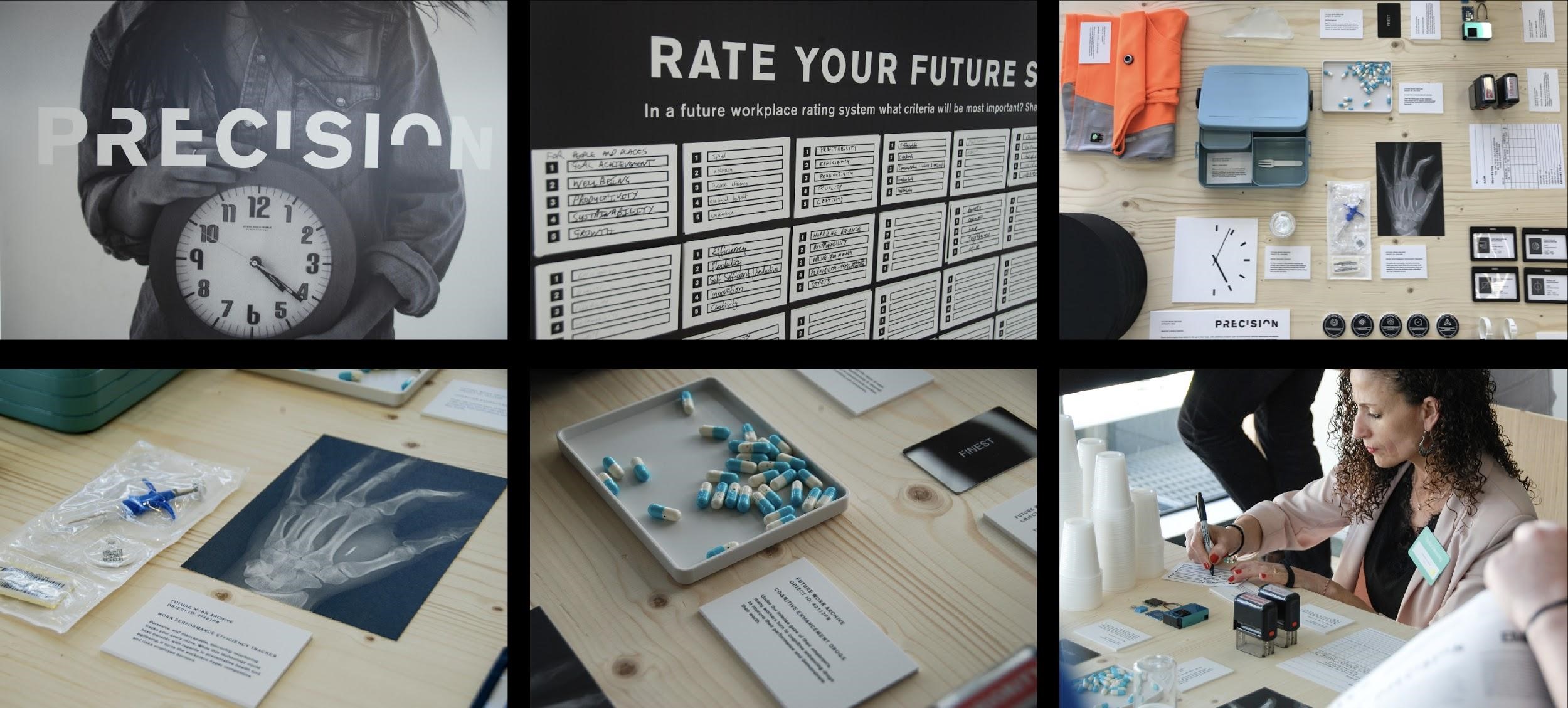
An empty waste bin demonstrates that we have entered a new era of resource efficiency, while other artefacts reveal workers are subject to the same standards. An empty water cooler suggests we no longer have time to shoot the breeze with colleagues, despite the positive impact this has on company culture. Injectable microchips and wearable surveillance apparel reveal just how bosses keep track of their staff. To keep up the pace, many workers have turned to cognitive enhancing drugs.
We brought to life fictional gig economy brands Finest and Worka, which were originally dreamt up in an essay Azeem Azhar wrote for the RSA’s Field Guide to the Future of Work. Finest is a new type of gig economy platform with an air of exclusivity – only for workers with the brightest minds, whose performance and empathy metrics pass a high threshold. At the other end of the spectrum is Worka, where work is available to anyone desperate enough to do mucky and miserable tasks such as moderating toxic content on social media.
Free hugs in the Empathy Economy
In the Empathy Economy, technology develops rapidly but is responsibly adopted. Dirty, dull and dangerous parts of people’s jobs are automated, as technology augments their capabilities, from virtual reality being used in retail to role-play customer interactions, to personal trainers using wearables to create bespoke training regimes for clients. As productivity and pay increase, disposable income flows into ‘empathy’ sectors and services such as social care, education, hospitality, entertainment and tourism that are resistant to automation.
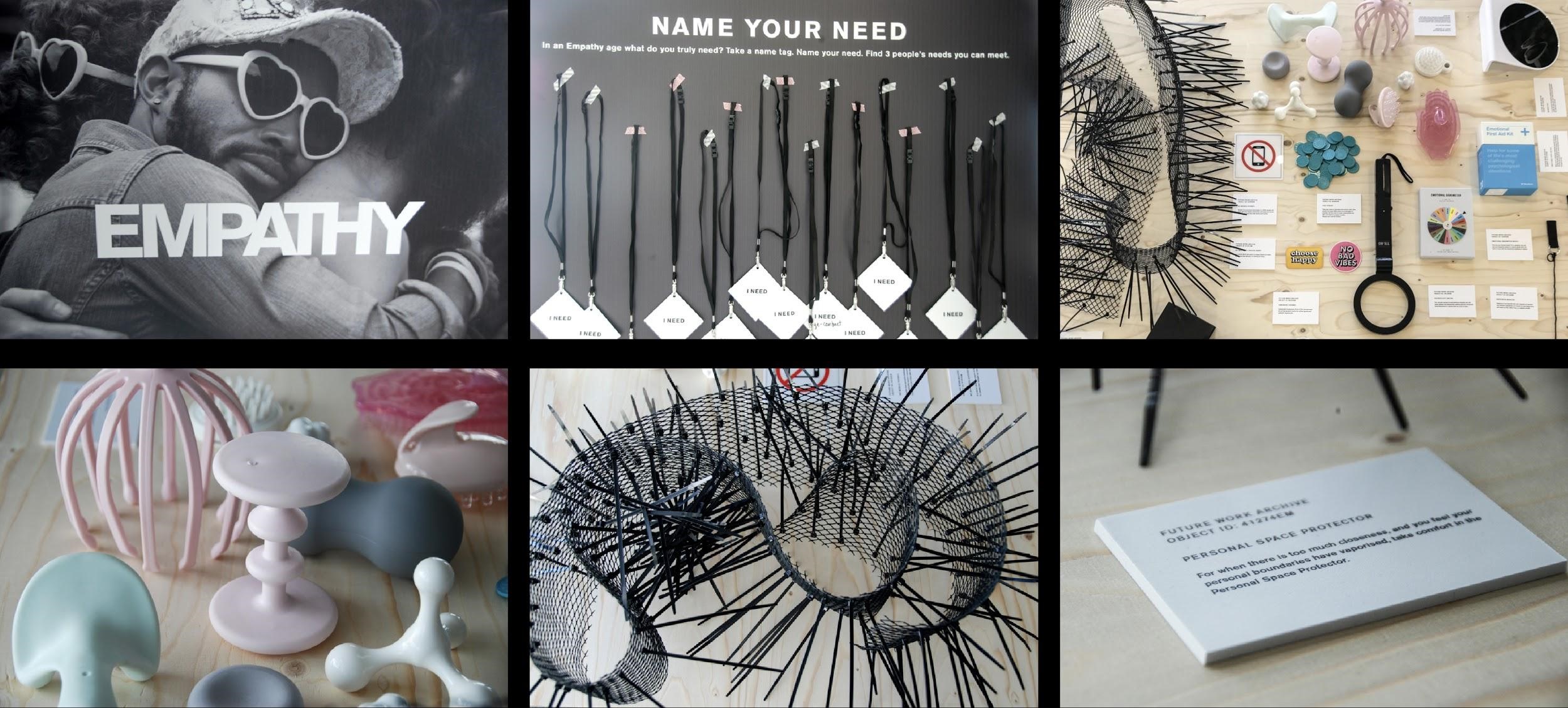
This is one of the most playful parts of the experience. Hug tokens are on display, with a label reading “while there is no shortage of empathy in this world, the fact that it has been commodified has left a sour taste in people’s mouth”. Empathy jobs can also be demanding, with people required to manage their emotions in service of boosting the feelings of others. But don’t worry – to manage all that emotional labour there are stress release toys and an emotional first aid kit.
Wellbeing is the new measure of success in this scenario. Our lifestyle aspirations are based on how happy they make us feel rather than on material wealth. So, we all need a happiness monitor to keep track. A handheld scanner – an authenticity meter – helps people seek out genuine emotional connections. You can try on our personal space protector, which is an essential wardrobe item for a future where sometimes there is too much closeness.
Finding ourselves in the Exodus Economy
The Exodus Economy explores the consequences of another financial crisis. Automation is limited as investment in new technology dries up. But the UK is stuck in a low pay, low productivity paradigm. The government has just introduced a fresh round of austerity measures. Firms have turned to zero to try and stave off bankruptcy. People get angry about ebbing living standards. Workers take to the streets, bringing the economy to a standstill. Others give up on consumer capitalism altogether and escape to the countryside in pursuit of an alternative lifestyle.
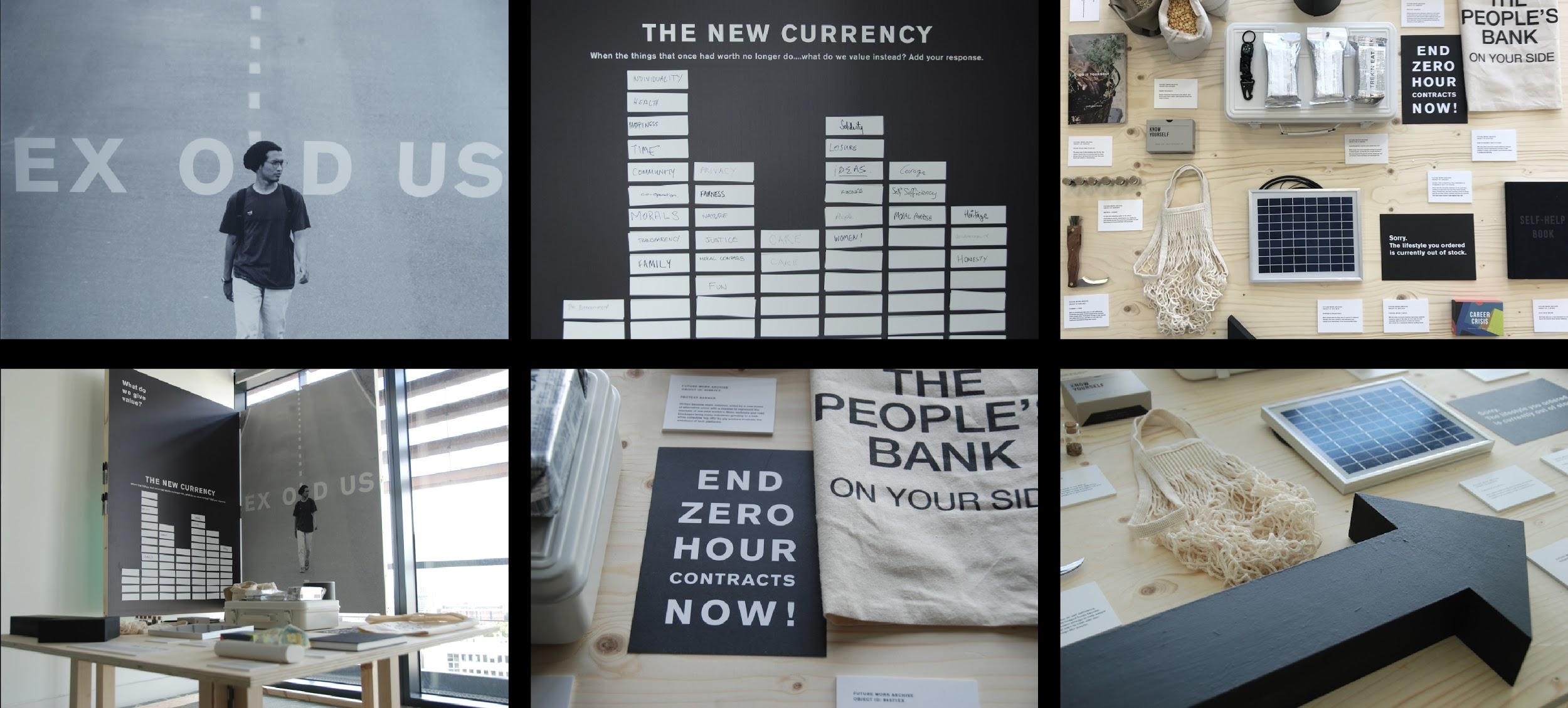
The Exodus Economy was the scenario that workshop participants often struggled with. Some suggested that “it’s the most bleak”. Others said it is something they are worried about with the UK’s imminent departure from the EU. But the Future Work Archive has given this scenario a new lease of life by bringing to the fore some of its redeeming qualities.
How would people live in a post-capitalist Britain? A portable solar panel shows how we’ve made a transition from oil dependence to local resilience. Equal rations of lentils and rice illustrate how we now allocate essential resources such as food. A tote bag reads: ‘The People’s Bank – on your side’, as our institutions are now co-operatively owned. Foraging equipment and ‘grow your own’ kits suggest many are living a life rooted in self-sufficiency. But the transition has been tough. Tough enough to warrant a government-supplied survival kit.
A shredded £5 note symbolises that the old currency is dead. We invite participants to suggest what we will value instead.
We have already exhibited the Future Work Archive at several of our events. We hope that it leaves audiences feeling empowered to navigate an uncertain future. We also hope that the archive will help the RSA reach new audiences beyond the think tank bubble. In the next phase of the Future Work Centre we will be taking the archive on a roadshow to town centres, schools, galleries, conferences and festivals. If you’re interested in hosting it, please get in touch.
Related articles
-
8 ideas for a new social contract for good work
Alan Lockey Fabian Wallace-Stephens
Alongside the moral urgency of the pandemic, the challenges of growing economic insecurity and labour market transforming technologies require a new social contract for work.
-
Low pay, lack of homeworking: why workers are suffering during lockdown
Fabian Wallace-Stephens Will Grimond
New RSA analysis finds that those least able to work from home are often the lowest paid.
-
Four futures of skills and learning in Scotland
Fabian Wallace-Stephens
What skills will workers need in the future? And how should educators, employers and policy makers respond to shifts in the labour market? We worked with Skills Development Scotland to explore these questions.

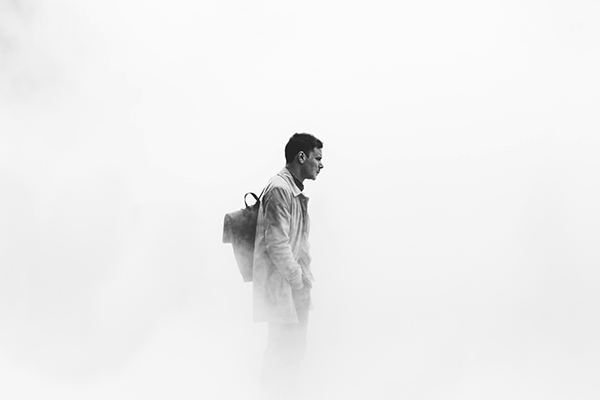


Be the first to write a comment
Comments
Please login to post a comment or reply
Don't have an account? Click here to register.